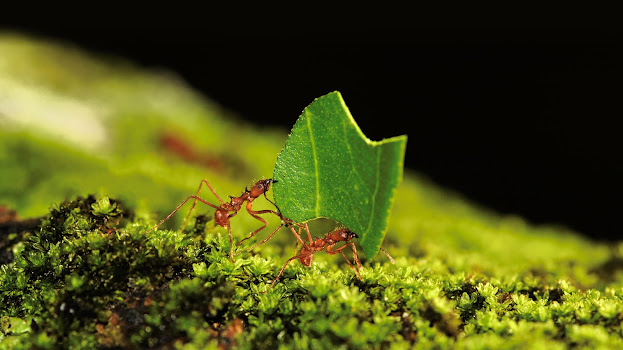''' '' ANTS -NATURE'S-
ARTS '' '''
WHO RUNS THE WORLD? : ANTS. EARTH IS OVERFLOWING with these insects, but they're no menace. Humans could learn a lot from them.
HUMANS ARE -OF COURSE- SMARTER AND BIGGER THAN ANTS - and in the past 300,000 years or so of our species' reign, we have conquered the planet and commandeered its resources to a degree perhaps unmatched in the history of life.
But compared with those of ants and other social insects - bees, termites and some wasps- our record is a hilarious blip. Ants have been around for 140 million years. They are a dominant feature -often some of the primary ecosystem engineers - of nearly every land-based ecosystem on Earth.
And they are the true inventors of what we think of as several quintessentially human endeavours.
In September, scientists at the University of Hong Kong published the complete census of ants ever assembled. The numbers are so big as to seem made up.
The study estimated that there are at least 20 quadrillion that is :
20,000.000,000,000,000 - ants on Earth. That's about 2.5 million ants for every human being.
And because the study relied on a conservative estimate for ants that live in trees and did not include subterranean ants, the census is almost certainly an undercount. ''I wouldn't be surprised if it actually turns out to be an order of magnitude higher,'' Sabine Nooten, an author of the study, told The Times.
The numbers floored me. Like perhaps every kid, I went through a period of intense childhood obsession with ants, spending endless summer afternoons in the backyard observing the mystery and majesty of ant life - how unbelievably many there were, how elegantly they organized themselves, how terrifically busy they all seemed.
WHAT has always beguiled me about ants is how their similarities to humanity - they live in societies, they've all got jobs, they endure arduous daily commutes to work - are offset by incomprehensible alieness. So much of ant life makes no sense to us : There's the abject selflessness, the subsuming of the individual to the collective.
There's the absence of any leadership or coordination, their lives dictated by instinct and algorithm, out of which emerges collective intelligence. There's the way they navigate and communicate through chemical signals, creating road signs from pheromones and never getting stuck in traffic jams.
But the quadrillion ant sensus got me thinking about ants in a way I hadn't before - as a social species not just remarkably different from our own that is in many ways unquestionably superior.
Ants, I keep thinking, are an example for humanity to emulate. Over tens of millions of years of evolution, ants have figured out how to become astonishingly numerous without depleting the world around them. Indeed, just the opposite is true :
Because they provide so many important functions to their habitats, they are ''the little things that run the world,'' as the great sociobiologist and ant enthusiast E.O. Wilson once wrote ants and other invertebrates.
It is natural, as a human, to slip into thinking of our species as somehow special. By many objective measures, though, ants are far more consequential to life on Earth than we are.
Wilson pointed out that if people were to disappear, little about the world would change for the worse; if ants and other invertebrates did, nearly everything would suffer. Ants aerate soil, transport seeds and aid in decomposition; that mounds serve as dense nutrient oases that are a foundation for a wide range of life.
Given their centrality to life on the planet, not to mention their teeming populations, shouldn't we think more highly of ants? They are among the most sophisticated and successful life-forms ever to crawl the earth.
In a paper published this year, the ecologists Catherine Parr and Tom Bishop suggested that even climate change, our species' great stain on the planet, might not prove a great calamity to ants, whose social structure will allow them to ''ride out environmental changes to a much greater degree than solitary organisms.''
Which, really, is no surprise. Ants were here before us, and they are likely to long outlast us. They run the place. We're just visiting.
The Honour and Serving of great research, great thinking, and great writing, continues. The World Students Society thanks author Farhad Manjoo.
With respectful dedication to Nature, the Scientist Researchers, and then Students, Professors and Teachers of the World. See Ya all prepare and register for Great Global Elections on The World Students Society - the exclusive ownership of every student in the world : wssciw.blogspot.com and Twitter !E-WOW! - The Ecosystem 2011 :
Good Night and God Bless
SAM Daily Times - the Voice of the Voiceless

.png)


0 comments:
Post a Comment
Grace A Comment!